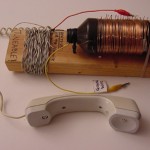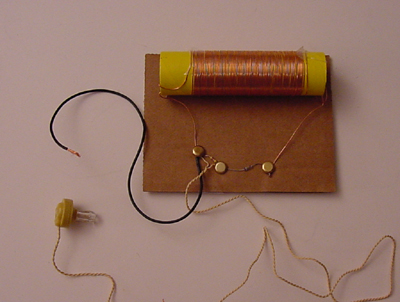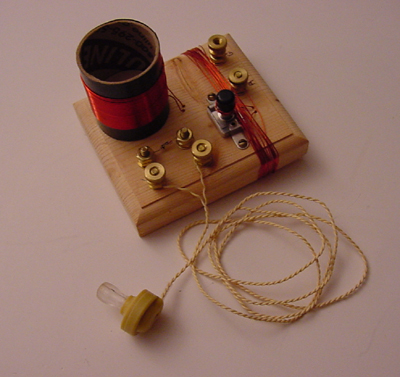 This article has all the information you need to complete a Science Fair Project, including instructional step-by-step video, documentation, required forms, experimentation tips and tricks, and how to squeeze your great idea into the scientific method.
This article has all the information you need to complete a Science Fair Project, including instructional step-by-step video, documentation, required forms, experimentation tips and tricks, and how to squeeze your great idea into the scientific method.This experiment is for advanced students.
[am4show have='p9;p63;' guest_error='Guest error message' user_error='User error message' ] Step 1: Download the Project Guide.
Step 2: Watch the video here...... but note that this video is LOOOOOONG - nearly 2 hours! We just didn't want to forget anything, and we also wanted to give you all the best information we have, so enjoy! (And you'll find that the video intro is the same as the last project's.) If you just want the Crystal Radio video itself without all the Science Fair stuff, click here for project-only video.
Step 3: Download the parts list and data sheet. (You'll need the free Adobe Reader view the PDF files.)
Need parts?
- Toilet paper tube
- Magnet wire
- Germanium diode: 1N34A
- 4.7k-ohm resistor
- Alligator clip test leads
- 100’ stranded insulated wire (for the antenna)
- Scrap of cardboard
- Brass fasteners (3-4)
- Telephone handset or get a crystal earphone
Step 5: Log your data and chart your graphs. Download a copy of Excel from Microsoft. Once you have Excel running, use it to chart your data. Click here for sample Excel file.
Step 6: Write your report. You'll find a sample report in the Project Guide.
Step 7 : Build your display board and exhibit. Find tips & tricks in both the video and the Project Guide. Click here to view the sample display board format.

 [/am4show]
[/am4show]
Yes you can. Just sand both sides really well, wrap together the exposed sections together and solder (if you have a soldering iron). Wrap with electrical tape and you’re all set!
can you splice magnate wire together? is it easy to find magnate wire? How much does it cost?
You can’t use regular (electromagnetic) headphones with this because they work entirely different than crystal earphones. You need to get a crystal headphone, or use an OLD telephone handset. I found a crystal earphone on Amazon.com for less than $3.
how do you connect regular headphones to this ?
AM.
does this pick up AM and FM or??
Thank you I’m going to go get it at the store.
Seth,
No, this is only a receiver. You can transmit your voice over a laser beam with the laser communicator project though.
Can you use it as a walkie-talkie?
Caleb Skipworth.
Can it be used as a sort of phone?
Thank you so much for your help. I will send the SASE in right away!
Denise
Here are a few different sources for the diode:
Micro-Tools
Open Tip
Web-Tronics
And guess what…! I just peeked in our inventory and we have a stash of these in the shelf. If you send us a SASE and a note letting my team know what you need, I’ll put one in the mail to you. How does that sound?
Supercharged Science
585 Luneta Drive
San Luis Obispo, CA
93405
Radio shack doesn´t seem to have the germanium diode and C. Crane sends me to a page with a lot of choices. I am not sure what I need to get. Could you please help me!!
Thanks,
Denise
Wow – sounds like you’ve been doing some super cool experiments and learning lots of things! 🙂 With the designs we have on our website, you can expect to get 1-4 radio stations. I think you’ll benefit more from people who have been building these for decades. You can find these folks here:
http://www.midnightscience.com/rapntap/
Hi,
So our third grader just participated in our local Homeschool Science Fair. He made a project of the Crystal Radio concept by experimenting with the number of tuner tubes – 1 magnet coil, 2 magnet coils, and finally one with four magnet coils (400 ft of magnet wire used across the projects!). He found the quality improved the most with the four tuner model. He received a first place in his category and grade and so he was asked to participate in the regional fair in late March. He, as well as us, are wondering how we could improve on the project. The model that we made took your approach of a variable tuner with the paper towel tube. I have to confess it was these tubes that took the most time. We were not having good contact between the wire and the Aluminum Foil on the upper and lower connections on the paper towel tubes. We utilized a Multimeter to verify a good connection. I ended up helping my son by soldering a paper-clip to the wire and then attaching with tape to the Aluminum Foil. We are also using a Germanium Diode, 90-100 feet of Antenna, and a good Ground…. On the unit with four magnet coils, we took your suggestion and hooked in a handset – the signal is quite strong when the Antenna is outside. However, we are only receiving one of three or four AM stations. We only live a few miles outside of town, and the other stations are the same strength as the station we are receiving. The strange thing to us is when one of the units did not have a good connection, we were receiving 2 to 3 stations. While we did a lot of research, neither one of us fully understand the principles behind Crystal Radios. Is there something that we are doing wrong regarding the tuner?
Thanks,
Anita Mullins
Hi Aurora,
You just keep making Science Learning Space better and better!
I know this project says “for 9th – 12th graders”, but my 9 year old son saw this and just had to do it! He loves working on projects that he finds here, and all four of our kids enjoy (and learn from!) cruising around the site and trying out different experiments. Even though I’m also a “retired” scientist and thus we do a lot of science-fun stuff “with Mom”, the freedom to explore on their own that comes from letting them loose on the website here is a great motivator in their learning experience.
Thank you, thank you, thank you!
Sherry C
I fixed the problem – try this link instead:
http://www.awesomescienceprojects.com/documents/sfp-crystalradio-materials.pdf
Hi,
While we are able to open other PDFs on your site, we are receiving a “corrupt” message when we attempt to the parts list on this page:
https://www.sciencelearningspace2.com/2010/01/documents/sfp-crystalradio-materials.pdf